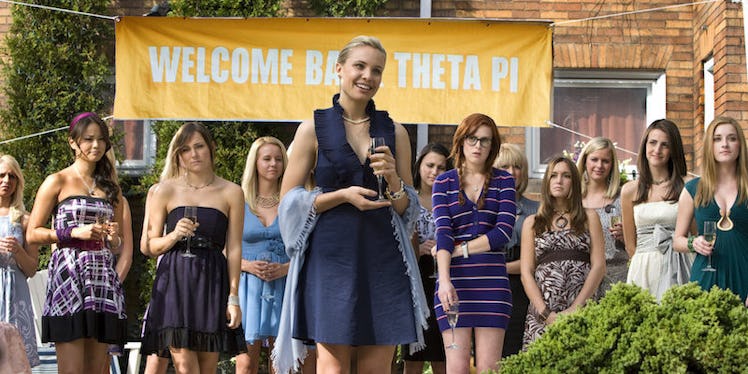
The Other Side Of Scandal: How Greek Life Saved My Mental Health
The scandals of Greek life are well known.
These days, it's nearly impossible to peruse the Internet without stumbling upon the latest fraternity or Greek life-centered scandal.
Torrid exposés on hazing and party culture appear all too often, but like all things, there are hidden perspectives, stones unturned and voices silenced.
I don't disagree with any allegations, nor wish to defend those brothers guilty of such disgraceful practices. My story, on the other hand, is just as worthy of attention.
The Greek system is rarely given enough credit.
Just when the criticisms had begun to slow down, "Goat," a graphic film depicting fraternity hazing based on a memoir by Brad Land and starring Nick Jonas, premiered at Sundance 2016.
The unforgivable actions of any individual chapter or Greek-affiliated organization potentially threatens a legacy that has persisted over 100 years across countless universities.
I've always known I wanted to “Go Greek.”
I watched and listened to the older women in my family recount their fond memories of sisterhood. It was mainly the social aspects I was familiar with at the time, and the opportunity to be a part of a family outside of blood relation.
Nevertheless, I was excited for when my day would come.
When it came time for college, I found myself moving cross-country to a giant Big 10 university, vastly different from any environment I had ever known.
Before I knew it, I was in desperate need of that sisterhood I had dreamed of for so long.
But even then, I didn't realize what a huge part my chapter would play in my life.
I was plagued by depression the entirety of my freshman year. I felt worthless. I saw myself as a failure trudging through the snow, numb to the world around her.
I made a few friends within my pledge class, mainly bonding around our social schedule and birthday dinners. These were interactions that often made it difficult to reveal my complicated state of mind.
I withdrew from the people that knew me best, and the ones I had just begun to know.
It was a never-ending cycle of shame and disappointment that I felt I couldn't share with any one.
My sorority “big sister” was the first person to knock at the walls I had built around myself. She recognized what I couldn't admit at the time -- that I needed help -- and for that, I am forever grateful.
At a moment when I was self-destructing, she stepped in and did all she could to pull me through. I owe her the world.
But as the days ticked by, summer was around the corner and I felt more detached than ever. Despite my own shortcomings, I felt as if my school had failed me too.
I began to see the major drawbacks of a large public institution:
I was turned away from the counseling center because I wasn't “suicidal.”
Had I checked the “suicide” box on their intake form, I would have been seen within the next few days. However, I was turned away and did not receive an appointment for an additional six weeks.
I had barely left my bed. I had given up on any semblance of a bright future. I felt betrayed by my own mind, but according to my university, that wasn't good enough for access to a therapist.
I went home that summer feeling abandoned, not only by every fiber of my being, but by the institution with which I had entrusted with my education. It's a concept I would have guessed would include mental wellbeing.
Luckily enough, my sorority was there to provide me companionship when the remainder of the university had failed to do so.
Within the first few weeks of coming back to school, I revealed to my pledge class the nature of my mental health struggles.
To my closer friends it wasn't much of a surprise, but for others, it was the opening of a door to friendship and honesty.
I had moved into a three-story brick home with 60 sisters, all of who knew the basics of my thought process. This seemed daunting at the time, but now one I am grateful for every single day.
It started out small with just the simple, “how are you?” echoing through the halls each morning.
Once I addressed the elephant in the room, I was able to slowly emerge from the shadows and become engrossed in my environment.
Suddenly, without even noticing it, I found myself making the conscious decision to chat in the living room after dinner instead of running up to my room only to sit in silence.
For the sisters who held my hand on the nights I went out, only a few inches away in case I felt a sudden cloud fall over my body, I thank you.
For the ones who stayed in to watch a movie when being social seemed too exhausting, I thank you.
And for our dear house mom who comes to check on me whenever I'm reclined on the sofa, I thank you.
Beneath the scandals, we often forget to acknowledge all that Greek life has done for so many of us. I know I never forget.
Each day, when I awaken to a buffet breakfast with 60 of my closest friends, I am beyond thankful for simply being there. I was headed down a dangerous road, a road I almost didn't come back from.
I have my family (both blood and initiated) to thank for saving me.
Without Greek life, I would not be the person I am today: a young woman excited for the future that lies ahead.
To my sisterhood, and especially my pledge class, thank you for steadfastly loving me on my road to recovery. I am forever grateful.